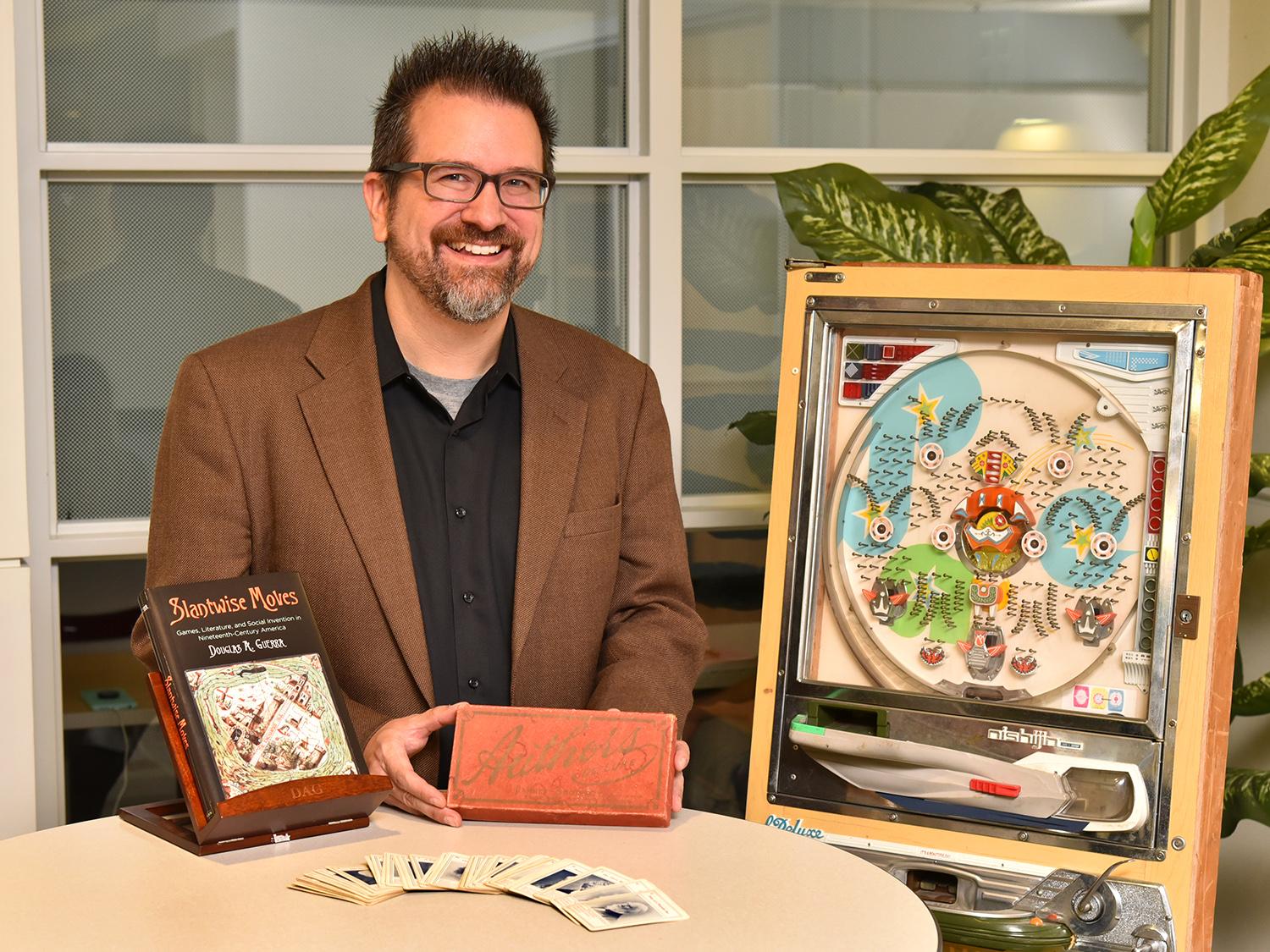Teaching through games -- Douglas Guerra of SUNY Oswego’s English and creative writing faculty recently earned the Popular Culture Association’s Ray and Pat Browne Award for his book "Slantwise Moves: Games, Literature and Social Invention in Nineteenth-Century America." The book connects 19th-century games and literature to teach readers more about the everyday lives of Americans.
A clever crossover between 19th-century games and literature earned a major popular culture award for Douglas Guerra of SUNY Oswego’s English and creative writing faculty.
Earlier this year, Guerra’s book, "Slantwise Moves: Games, Literature and Social Invention in Nineteenth-Century America" -- the result of years of research and passion -- won the Popular Culture Association’s Ray and Pat Browne Award for Best Reference/Primary Source Work.
In its chapters, the book takes a popular board game of the era, such as Milton Bradley’s first breakout hit The Checkered Game of Life, and correlates it with a significant book, such as Walt Whitman’s "Leaves of Grass," which is best known for “Song of Myself.”
Bradley and Whitman, for example, use similar techniques of centering the playing piece or character as an avatar for something else. “Whitman is doing something like what Milton Bradley’s Checkered Game of Life is doing,” Guerra said. “But Bradley’s game might give us a better idea of how to read Whitman, by imagining what people were doing with media like books in interpersonal settings -- how people used leisure artifacts to create social feelings.”
Games, Guerra said, are a great way of learning about people -- both about people one meets as well as people throughout history. He wanted to bring a roleplaying sensibility to some of the analysis, as games can stage social performances.
“Literary criticism is often experimental. It centers on the potentials in a piece of media and the methods of approach,” Guerra said. “The mechanics of a game force similar considerations, but also allow you to explore a typical social dynamic not limited by literacy.
“Books and games are not that distant,” Guerra added. “They were produced in the same print shops and used by the same people, and studying them can tell you about regular behaviors in a society. A game tells you not just what people thought, but what they must have been doing.”
The more he researched the topic, Guerra said, “I realized that this history doesn’t exist.” Existing scholarship worked in broad strokes, and tended to lump together the games of the 19th century. He also studied how what people play reflects, and has an impact on, their everyday lives.
Gaming background
Guerra comes from a family of engineers and makers, and moved around a lot as a kid, so games were a primary way of making friends.
“I’ve always been a gamer,” Guerra said. “In a way, this project was kind of making what you love become what you do.”
His first year at Oswego, Guerra received an Early Start grant to begin research the summer before he began teaching, which both got the book rolling and facilitated bringing some of these ideas into the classroom.
He found that researching game history is serious business. Given the lack of study on the topic, Guerra went to archives, looked up patents and trade catalogues and perused the back matter of books for advertisements. He read through back issues of the Springfield Republican -- Bradley’s hometown newspaper, run by a friend who helped him advertise and print some of his earliest work. “A lot of the background on Milton Bradley is new history,” he said.
Guerra would find antiquated board games in archives, take them out and start playing them to get the feeling for what people would have done with them. “Other historians would come over to see what I was doing with them, which underscores the social magnetism of games,” he said.
“I wrote 'Slantwise Moves' with scholars and students in mind, but I tried to keep a balance between going too deep in literary theory and keeping it accessible for general audiences,” Guerra said, as he focused on finding a way to engage anybody interested in literature, history or games.
“Each chapter touches on one of the most important games, or types of games, that took games mainstream with the American public,” Guerra said, with chapters including fill-in-the-blank games, billiards and saloon games, tangrams and puzzles, and card games.
Everyday relevance
“It feels important in terms of unflattening history,” Guerra said, by which he means providing content on everyday life that does not stay in one discipline or form of media.
Receiving the award at the Popular Culture Association conference, which was “this wonderful big tent of people studying popular culture in all these different forms,” was a thrill, Guerra recalled. He felt proud to be recognized by an organization that uses popular culture to impart important lessons and make fields like history and literature more accessible to a wider audience.
Even as some complain about how much time younger people spend on various screens, the continuing popularity of board games and in-person roleplaying activities like Magic: The Gathering and Dungeons and Dragons show that people still want to bond over games, especially ones requiring cooperation.
“There’s something hopeful to me about the social encouragement of game play,” Guerra said. “That there’s this resurgence of cooperative games and games with large numbers of players shows that people are trying to find new ways to connect with each other and work together -- and those energies are critical to the challenges we face today.”




